|
Eric Daley.
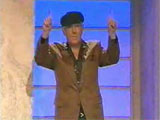 CLIVE
ANDERSON: There are only a few great rock stars, even fewer mega
stars, perhaps only a handful of rock legends. So it gives me great
pleasure to introduce one of the only mega-legendary star rockers.
The great, not late, Eric Daley. CLIVE
ANDERSON: There are only a few great rock stars, even fewer mega
stars, perhaps only a handful of rock legends. So it gives me great
pleasure to introduce one of the only mega-legendary star rockers.
The great, not late, Eric Daley.
ENTER PETER COOK. HE WEARS BLUE JEANS, A LIGHT BROWN JACKET, A
BLACK OPEN NECK SHIRT AND BLACK CAP. HE WAVES TO THE AUDIENCE USING
ONLY HIS INDEX FINGERS.
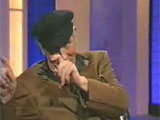 CA:
It's marvelous. It's marvelous - CA:
It's marvelous. It's marvelous -
PETER COOK PUNCHES CLIVE ANDERSON ON HIS SHOULDER. CLIVE ANDERSON
RUBS HIS SHOULDER BEFORE PUNCHING HIM BACK.
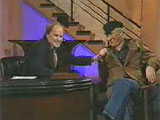 CA:
It's marvelous to - CA:
It's marvelous to -
BOTH CLIVE ANDERSON & PETER COOK BEGIN CORPSING
CA: It's marvelous to have -
PETER COOK REPEATS HIS INDEX-FINGER-WAVING TO THE AUDIENCE
CA: No, concentrate. It's marvelous to have one of the great rock
stars of all time, but let's go back to your early career. Perhaps
for the younger viewers who may not have been familiar with it.
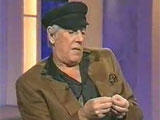 ERIC
DALEY: Yeah, well as you know, I started very, very young at school
with Reg and Jez - ERIC
DALEY: Yeah, well as you know, I started very, very young at school
with Reg and Jez -
CA: Yes -
ED: And we were just mucking around with skiffle, yah hah, a bit
of lee lah -
CA: Yeah -
ED: A lot of that old Ethiopian sound, which we had in before it
got fashionable -
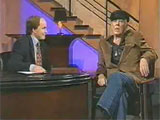 CA:
Yes. Yes, this was The Corduroys, of course? CA:
Yes. Yes, this was The Corduroys, of course?
ED: Yes, The Corduroys. That was the first group. God rest them.
CA: Yeah. Well of course Jez was the motivating force behind -
ED: Well Jez, God rest him. Jez, some would say he was the creative
one of the three. I mean without Jez we would have just been a duo.
CA: Yes.
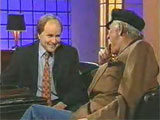 ED:
But with Jez, there were three of us there. We all had - we had
our little battles. We had our little battles. We had our, you know.
A little bit of - ED:
But with Jez, there were three of us there. We all had - we had
our little battles. We had our little battles. We had our, you know.
A little bit of -
CA: Yes.
ED: And, err, he wrote most of the, he wrote the songs that were
immediately available -
CA: Successful. The successful songs.
ED: The ones... Yes.
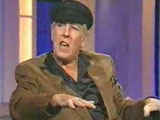 CA:
But your ones didn't really - CA:
But your ones didn't really -
ED: Ours was more the early white noise sort of - the type of sound
you can't get into at once. The sort of sound you can only get into
years later.
CA: If then.
EA: If then. Well, it's avant garde. But Jez was, he was the one
with the -
CA: Talent?
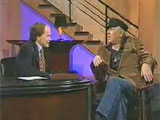 ED:
Tunes. ED:
Tunes.
CA: Tunes, yes.
ED: Melodically, melodically he had the tunes. But looking back
on those records, or listening to them even, you get a feeling of
the times. You get a feeling of everything was full of hope -
CA: It was the Sixties.
ED: It was, it was. It was a time of, err, rejoicing. A feeling
of, err... You could do anything if you just tried. And Jez tried
and died, we tried and lived.
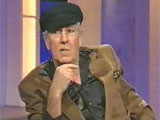 CA:
Yes, fair enough. In the Seventies of course, you went on to form
one of the first super groups. CA:
Yes, fair enough. In the Seventies of course, you went on to form
one of the first super groups.
ED: Yeah, Ye Gods.
CA: Yes.
ED: It was err, it was one of the... I suppose the first great,
all white super group.
CA: Yeah.
ED: It was just me, and some other people I brought in, into the
group.
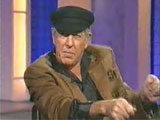 CA:
Yes. CA:
Yes.
ED: Who were very good in their own right. There was a little boy
we found in Pittsburgh, "Blind" Tony Tintin.
CA: Yes.
ED: Just a little kid, he was about eight years old and he played
like a dream. Played like a dream. He'd do [PETER COOK MAKES A NOISE
THAT SOUNDS SOMETHING LIKE THE FOLLOWING, WHILST MAKING DRUMMING
ACTIONS] pit-titty-doop, pid-diddley-doop, pit-titty-doop, doop,
doop, pitch-itchy-choo, choo-choo.
CA: He was the drummer was he?
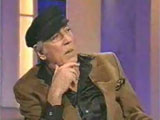 ED:
No, that was vocals. [CONTINUES WITH THE "pitch-itchy-choo"
TYPE NOISES]. Oh, he was a dream! ED:
No, that was vocals. [CONTINUES WITH THE "pitch-itchy-choo"
TYPE NOISES]. Oh, he was a dream!
CA: Yes.
ED: But we never toured, because we could never find the venues.
CA: Yeah.
ED: Cause those were the days... I say it myself. I mean, it's
on the public record, I've done a lot of drugs.
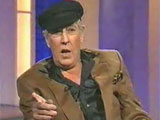 CA:
Yes. CA:
Yes.
ED: I've done a lot of drugs and I've slept with a lot of women.
CA: Yes.
ED: And boys and girls at home, don't. If you think that by sleeping
with thousands of women and taking thousands of drugs, you're going
to have a good time, let me just say this, don't. Because I'm telling
you, I just got out of the Henry Ford clinic, and I'm -
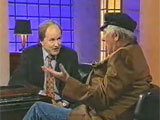 CA:
Henry Ford clinic? CA:
Henry Ford clinic?
ED: Yes.
CA: Not the Betty Ford clinic?
ED: No, the Henry Ford one is a much tougher regime. You have to
build a car before you're allowed out. But seriously, you scrub
your own toilets, and read your own newspapers and everything like
that.
CA: Yes.
ED: And thank god, just for today, I'm clean and sober. And I would
not like it to be any other way.
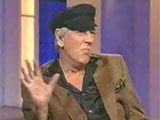 CA:
No. CA:
No.
ED: So don't. Whatever you do, don't.
CA: That's your message? Now in the Seventies, you -
ED: Just say "Hmm, maybe." - nah, just kidding.
CA: Yeah, I know, fine. Now Ye Gods of course, your big hit, the
one that most people... what was it? "I love it"?
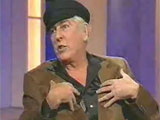 ED:
"I love it," yes. Such a simple lyric actually. I mean
it's silly to be proud of it, but I am. It's just... the lyric is
"I love it". As simple as that. Just with a little tune
underneath. "I love it. I love it, I love it, I love it. I
love it, I love it, I love it. I love it, I love it, I loooove it.
I loooove it. I looooooooove it. It. It. It. It. It. It!" and
then, of course you need all the other people there at the same
time, don't you? It's no good just doing alpollicello, whatever
it is. ED:
"I love it," yes. Such a simple lyric actually. I mean
it's silly to be proud of it, but I am. It's just... the lyric is
"I love it". As simple as that. Just with a little tune
underneath. "I love it. I love it, I love it, I love it. I
love it, I love it, I love it. I love it, I love it, I loooove it.
I loooove it. I looooooooove it. It. It. It. It. It. It!" and
then, of course you need all the other people there at the same
time, don't you? It's no good just doing alpollicello, whatever
it is.
CA: Yes. Fair enough. What about your film career? That's been
a bit up and down, hasn't it?
ED: I think I made a mistake in accepting the parts I did. I should
never have played Edward the Confessor... I was at a loss, it wasn't
my territory.
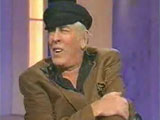 CA:
No. Now you've become very interested in the environment. CA:
No. Now you've become very interested in the environment.
ED: Yeah, I love it. I love, I love it! Can't get too much of it.
CA: Yeah.
ED: It is such a great thing to have. And we are the only species
in the world, Clive, who systematically goes round destroying it.
CA: Yes.
ED: You won't get a whitebait going round saying... you won't find
an anchovy going into the rain forest and saying "Let's tear
it all down and put up a hotel."
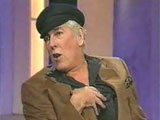 CA:
True enough. CA:
True enough.
ED: But only man. And without the environment we would not be able
to live. This is my view.
CA: Yes.
ED: And that's why I think we should succour it, harbour it, look
after it. As if it were our own child.
CA: Yes, and of course you have your own anchovy -
ED: Child. Yes I have my own child.
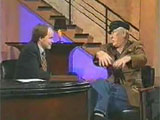 CA:
Yes. No. You have your own anchovy farm, don't you? CA:
Yes. No. You have your own anchovy farm, don't you?
ED: Yeah, it's just a small contribution to the environment. It's
an unnatural salt lake, which I've built in Hertfordshire.
CA: Yes.
ED: Where I've got anchovies. Millions of them, swimming round
and breeding and it takes a bit of money to keep them going, but
it's lovely to see them happy. And the swans, the black swans fly
over, and swoop. And I say "Don't you dare. Don't you dare.
I'm saving these little creatures and just 'cause you're peckish
mate, doesn't mean I'm not going to blast you out of the sky if
you touch my anchovies."
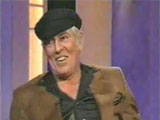 CA:
You're very keen on the - CA:
You're very keen on the -
ED: There's a little irony there, isn't there.
CA: Yes there is. You've come a long way from your early days.
ED: I've come a long way from my early days.
CA: Yeah, those early rocking days to owning a country house and
everything .
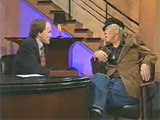 ED:
Yeah, I love the country. We're lucky to have a place in the country,
very near town. So we've got the best of everything really. And
Laura adores it, you know. She, she... that's my wife. ED:
Yeah, I love the country. We're lucky to have a place in the country,
very near town. So we've got the best of everything really. And
Laura adores it, you know. She, she... that's my wife.
CA: Your fifth wife isn't it?
ED: Yeah, she came after the fourth one. And she's a beautiful,
beautiful woman. Very wise! Very, very wise. Probably got more wisdom
in her than I have.
CA: Yes. If that's possible. Now, I've got to ask you, because
I won't be forgiven. Is there any chance of Ye Gods reforming?
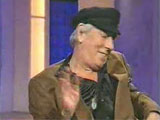 ED:
What can I say? ED:
What can I say?
CA: Well, yes or no would be handy.
ED: It's on the cards.
CA: It's on the cards?
ED: There's a big gig, for the environment, in 2004.
CA: Yes.
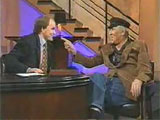 ED:
And we're hoping to get everyone mulled in and melded out. And get
them all in, from all over the world. And get them all on the stage,
and play that stuff again, man. ED:
And we're hoping to get everyone mulled in and melded out. And get
them all in, from all over the world. And get them all on the stage,
and play that stuff again, man.
CA: OK. Well, I want to be there.
ED: Be there Clive!
CA: Well, thankyou very much, Eric Daley!
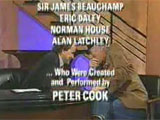 [CLIVE
ANDERSON WRAPS UP THE SHOW - CREDITS FOLLOW] [CLIVE
ANDERSON WRAPS UP THE SHOW - CREDITS FOLLOW]
RETURN TO TOP
|

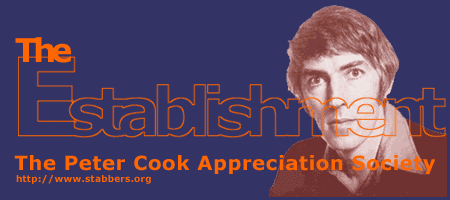
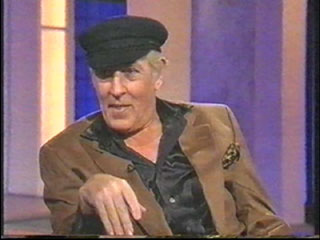 Eric
Daley
Eric
Daley  CLIVE
ANDERSON: There are only a few great rock stars, even fewer mega
stars, perhaps only a handful of rock legends. So it gives me great
pleasure to introduce one of the only mega-legendary star rockers.
The great, not late, Eric Daley.
CLIVE
ANDERSON: There are only a few great rock stars, even fewer mega
stars, perhaps only a handful of rock legends. So it gives me great
pleasure to introduce one of the only mega-legendary star rockers.
The great, not late, Eric Daley. CA:
It's marvelous. It's marvelous -
CA:
It's marvelous. It's marvelous - CA:
It's marvelous to -
CA:
It's marvelous to - ERIC
DALEY: Yeah, well as you know, I started very, very young at school
with Reg and Jez -
ERIC
DALEY: Yeah, well as you know, I started very, very young at school
with Reg and Jez -  CA:
Yes. Yes, this was The Corduroys, of course?
CA:
Yes. Yes, this was The Corduroys, of course? ED:
But with Jez, there were three of us there. We all had - we had
our little battles. We had our little battles. We had our, you know.
A little bit of -
ED:
But with Jez, there were three of us there. We all had - we had
our little battles. We had our little battles. We had our, you know.
A little bit of - CA:
But your ones didn't really -
CA:
But your ones didn't really - ED:
Tunes.
ED:
Tunes. CA:
Yes, fair enough. In the Seventies of course, you went on to form
one of the first super groups.
CA:
Yes, fair enough. In the Seventies of course, you went on to form
one of the first super groups. CA:
Yes.
CA:
Yes. ED:
No, that was vocals. [CONTINUES WITH THE "pitch-itchy-choo"
TYPE NOISES]. Oh, he was a dream!
ED:
No, that was vocals. [CONTINUES WITH THE "pitch-itchy-choo"
TYPE NOISES]. Oh, he was a dream! CA:
Yes.
CA:
Yes. CA:
Henry Ford clinic?
CA:
Henry Ford clinic? CA:
No.
CA:
No. ED:
"I love it," yes. Such a simple lyric actually. I mean
it's silly to be proud of it, but I am. It's just... the lyric is
"I love it". As simple as that. Just with a little tune
underneath. "I love it. I love it, I love it, I love it. I
love it, I love it, I love it. I love it, I love it, I loooove it.
I loooove it. I looooooooove it. It. It. It. It. It. It!" and
then, of course you need all the other people there at the same
time, don't you? It's no good just doing alpollicello, whatever
it is.
ED:
"I love it," yes. Such a simple lyric actually. I mean
it's silly to be proud of it, but I am. It's just... the lyric is
"I love it". As simple as that. Just with a little tune
underneath. "I love it. I love it, I love it, I love it. I
love it, I love it, I love it. I love it, I love it, I loooove it.
I loooove it. I looooooooove it. It. It. It. It. It. It!" and
then, of course you need all the other people there at the same
time, don't you? It's no good just doing alpollicello, whatever
it is. CA:
No. Now you've become very interested in the environment.
CA:
No. Now you've become very interested in the environment. CA:
True enough.
CA:
True enough. CA:
Yes. No. You have your own anchovy farm, don't you?
CA:
Yes. No. You have your own anchovy farm, don't you? CA:
You're very keen on the -
CA:
You're very keen on the -  ED:
Yeah, I love the country. We're lucky to have a place in the country,
very near town. So we've got the best of everything really. And
Laura adores it, you know. She, she... that's my wife.
ED:
Yeah, I love the country. We're lucky to have a place in the country,
very near town. So we've got the best of everything really. And
Laura adores it, you know. She, she... that's my wife. ED:
What can I say?
ED:
What can I say? ED:
And we're hoping to get everyone mulled in and melded out. And get
them all in, from all over the world. And get them all on the stage,
and play that stuff again, man.
ED:
And we're hoping to get everyone mulled in and melded out. And get
them all in, from all over the world. And get them all on the stage,
and play that stuff again, man. [CLIVE
ANDERSON WRAPS UP THE SHOW - CREDITS FOLLOW]
[CLIVE
ANDERSON WRAPS UP THE SHOW - CREDITS FOLLOW]